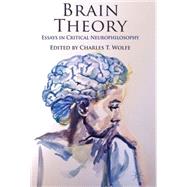From its beginnings until the present day, neuroscience has always had a special relationship to philosophy. And philosophy has long puzzled over the relation between mind and brain (and by extension, the relation of cerebral processes to freedom, morals, and justice, but also to perception and art). This volume presents some of the state-of-the-art reflections on philosophical efforts to 'make sense' of neuroscience, as regards issues including neuroaesthetics, neuroethics and neurolaw, but also more critical, evaluative perspectives on topics such as the social neuroscience of race, neurofeminism, embodiment and collaboration, memory and pain, and more directly empirical topics such as neuroconstructivism and embodied robotics. Brain theory as presented here is neither mere commentary on the state of the sciences, nor armchair philosophical reflection on traditional topics. It is more pluralistic than current philosophy of neuroscience (or neurophenomenology), yet more directly engaged with empirical, indeed experimental matters than socio-cultural discussions of 'brainhood' or representations of the brain.








